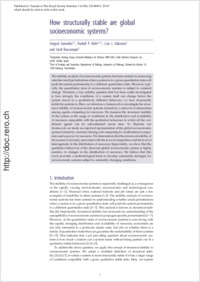How structurally stable are global socioeconomic systems?
- Saavedra, Serguei Integrative Ecology Group, Estación Biológica de Doñana (EBD-CSIC), Sevilla, Spain
- Rohr, Rudolf P. Integrative Ecology Group, Estación Biológica de Doñana (EBD-CSIC), Sevilla, Spain - Unit of Ecology and Evolution, Department of Biology, University of Fribourg, Switzerland
- Gilarranz, Luis J. Integrative Ecology Group, Estación Biológica de Doñana (EBD-CSIC), Sevilla, Spain
- Bascompte, Jordi Integrative Ecology Group, Estación Biológica de Doñana (EBD-CSIC), Sevilla, Spain
-
06.11.2014
Published in:
- Journal of The Royal Society Interface. - 2014, vol. 11, no. 100, p. 20140693
English
The stability analysis of socioeconomic systems has been centred on answering whether small perturbations when a system is in a given quantitative state will push the system permanently to a different quantitative state. However, typically the quantitative state of socioeconomic systems is subject to constant change. Therefore, a key stability question that has been under-investigated is how strongly the conditions of a system itself can change before the system moves to a qualitatively different behaviour, i.e. how structurally stable the systems is. Here, we introduce a framework to investigate the structural stability of socioeconomic systems formed by a network of interactions among agents competing for resources. We measure the structural stability of the system as the range of conditions in the distribution and availability of resources compatible with the qualitative behaviour in which all the constituent agents can be self-sustained across time. To illustrate our framework, we study an empirical representation of the global socioeconomic system formed by countries sharing and competing for multinational companies used as proxy for resources. We demonstrate that the structural stability of the system is inversely associated with the level of competition and the level of heterogeneity in the distribution of resources. Importantly, we show that the qualitative behaviour of the observed global socioeconomic system is highly sensitive to changes in the distribution of resources. We believe that this work provides a methodological basis to develop sustainable strategies for socioeconomic systems subject to constantly changing conditions.
- Faculty
- Faculté des sciences et de médecine
- Department
- Département de Biologie
- Language
-
- English
- Classification
- Economics
- License
-
License undefined
- Identifiers
-
- RERO DOC 258342
- DOI 10.1098/rsif.2014.0693
- Persistent URL
- https://folia.unifr.ch/unifr/documents/304710
Statistics
Document views: 134
File downloads:
- pdf: 180
